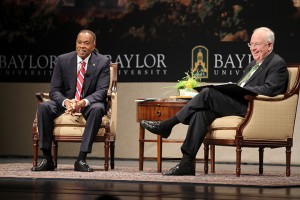
By Josh Gill
Reporter
In the midst of ever mounting public frustration with the federal government, Fox News commentator Juan Williams, a man with over 20 years of experience as a journalist covering America’s political scene, featured as the guest speaker in Baylor’s “On Topic with Ken Starr” Thursday evening in Waco Hall.
Williams and Starr covered a range of topics during their exchange, from the current political gridlock in Washington, D.C., to the Civil Rights Movement to Williams’ relationship with Nelson Mandela. The overarching theme of the exchange was the polarization of America, both in current time and in history.
Dr. David Garland, dean of Truett Seminary, said Williams’ experience as a journalist at the Washington Post over 23 years ago was particularly relevant to the issue of political gridlocking over controversial issues.
“As an African-American journalist in a mostly white newsroom, he gained a unique perspective, especially on race and Civil Rights,” Garland said.
The Civil Rights movement struggled with political gridlocks in Washington, D.C., much like the issues of health care and economic reform have in recent years.
When asked by Starr how bad the current political state in Washington, D.C., was, Williams said, “Pretty bad.”
Regarding the political problems in Congress and the politicians involved, Williams said it was an unfortunate repetition of similar impasse in America’s past.
“I think that these people are locked in a political gridlock that does not allow the aptitude of their character or spirit to show,” Williams said.
Williams cited various examples of division and political gridlock in America’s past, such as the accusations against President George W. Bush in 2004 concerning the invasion of Iraq, the economic crisis of 2008, the current arguments over health care, and the rise of the Tea Party and the Occupy Wall Street movement.
“People like me, people in the media, contribute to this polarization,” Williams said. “Nowadays we don’t so much broadcast the news, we ‘narrowcast’ the news. I think of it in these terms: we are losing a common language.”
Williams said that the current polarization of America is not only facilitated by news organizations catering to their viewer base, but also by politicians looking to drive up turnout in their voter base as opposed to appealing to the middle.
“All of this contributes to a very difficult atmosphere in Washington where nothing gets done,” Williams said.
In response to Williams’ bleak depiction of America’s political state, Starr asked Williams what he thought could be enacted to fix the polarization.
Williams said communication between people of differing opinions and the willingness of people to get their hands dirty in an effort to bring about change were the keys to solving the damage of political polarization.
“I would say that the key thing is to know each other,” Williams said. “I think it begins with a willingness to talk.”
Williams then cited President Lyndon B. Johnson as an example of a leader who facilitated progress by dealing with opposing political parties.
“President Johnson had the capacity to make deals because there were people willing to make a deal with him,” Williams said. “Today I don’t see that.”
With regard to what the current U.S. president could do to solve polarization, Williams said the president needs to reach out to those who oppose him.
“I think it would be good if President Obama did more in reaching out, even to people who have expressed antipathy toward him,” Williams said. “I think it is imperative for him to make an effort.”



